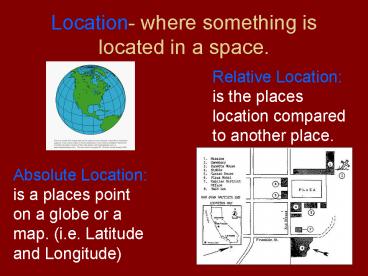Location- where something is located in a space. - PowerPoint PPT Presentation
1 / 40
Title:
Location- where something is located in a space.
Description:
Location- where something is located in a space. Relative Location: is the places location compared to another place. Absolute Location: is a places point on a globe ... – PowerPoint PPT presentation
Number of Views:94
Avg rating:3.0/5.0
Title: Location- where something is located in a space.
1
Location- where something is located in a space.
Relative Location is the places location
compared to another place.
Absolute Location is a places point on a globe
or a map. (i.e. Latitude and Longitude)
2
Place-What is it like?
A place is described by both its physical and/or
human characteristics
3
Region- physical features , human
characteristics, or both in common
- Possible regions
- Language regions
- Mountain regions
- Desert regions
- Cotton Belts
4
Movement-when people ,goods, and ideas move from
one place to another.
- People migrate to places
- Push and pull theory- what encourages people to
go to a place or leave one? - (poverty, overcrowding, political oppression,
education)
5
Human Environment Interaction
- Human environment interaction occurs because
humans depend on, adapt and modify the world
around them.
Building Houses, planting crops and building
roads are examples of human environment
interaction
6
1. Pay Taxes
- Pay for the benefits and services that citizens
receive from the government - (income tax, social security tax, property tax,
medicare tax, etc.)
7
2. Cast an Informed Vote
- Citizens should learn about candidates and issues
to make informed decisions when they vote.
8
3. Serve on Juries
- Serve on juries to decide court cases (jury duty)
9
4. Serve in the Military
- May need to serve in defense of your country
10
5. Volunteer for Activities that Promote the
Common Good
- Work to protect the environment, support
communities, and help the underprivileged.
11
6. Obey Laws
- Live within the laws
12
3.
13
4. Entrepreneur
- a person who assumes the risks of starting a new
business
14
4. Free Enterprise/Market Economy
-Businesses make the decisions based on supply
Demand -Higher quality of goods
services -Limited government interference -Used
in the US
15
4. Primary and Secondary Industry
Primary- prepares and processes raw
materials Secondary- Creates new products out of
raw materials
16
4. Limited and Unlimited Government
Limited Government Limited Power by the
citizens Unlimited Government Unlimited
Power (these two are just the basics of what you
need to know)
17
4. Culture
- groups shared beliefs, customs and language
18
4. Cultural Traits
- Language
- Style of Shelter
- Religion
- Food
19
4. Primary Source
(primary sources are materials created by people
who lived during historical events. They include
letters, diaries, photographsetc)
20
4. Secondary Source
- A textbook is an example of a secondary source
21
4 . Democracy
- Democracy is a form of government that allows
people to participate in the proposal,
development, and creation of laws. - Citizens cannot exercise their individual rights
at the expense of others
22
5. Three Branches of Government
- Executive (Enacts the laws)
- Legislative (Makes the laws)
- Judicial (Interprets (explains) the laws)
23
Tyranny
(We limit the power of our government to prevent
this)
24
6. The United States has a federal republic with
democratic traditions.
25
7. Bill of Rights
- 1st 10 amendments to the constitution
- Guarantees protections of citizens rights
- Defines powers given to the states
26
8. Checks and Balances
- Powers each branch has that allows them to check
up on the other branches
27
9. Declaration of Independence
- Document written by Thomas Jefferson that
announced the colonists freedom from Great
Britain - We hold these truths to be self evident that all
men are created equal.. - Opening line of the D of I
28
10. George Washington
- Commander of the Army during Revolution
- Defeated the British/English Army
29
11.
During the 1770s, the colonists were upset about
all of the taxes Great Britain was placing on
them without their consent
30
12. Reasons for colonization
- Many colonists fled Europe to escape punishment,
to gain religious freedom, preserve culture, and
to find new opportunities for a better life.
31
13. Colonies Economies
- Southern Colonies- Tobacco
- New England Colonies- Shipbuilding
- Middle Colonies- Grain
32
14. Native Americans
- Helped early colonists in America by teaching
them farming skills
33
- British taxed colonists on sugar and molasses
coming into the colonies from other places - British imposed taxes upon all paper products
and stamped the item once the tax had been
played. - under the law, colonists had to provide housing,
candles, bedding, and beverages to British
soldiers stationed in the colonies.
Sugar Act
15.
Stamp Act
Quartering Act
34
Citizens under 18
- Fulfill a part of their civic duties by attending
school
35
Geographer
- Studies how location influences the way people
live
36
All societies have
- Government
- Religion
- Family
- Economic System
- Language
37
Lack of oil in US
- We trade with oil producing countries of our
shortage of oil
38
Mechanization
- Reason why there are fewer farms and farmers now
in the US
39
Economist
- Studies the production and exchange of goods and
services
40
Traditional Societies
- Closely linked to the natural environment































